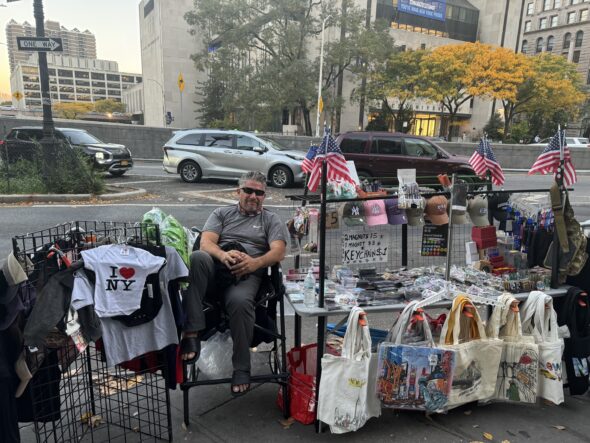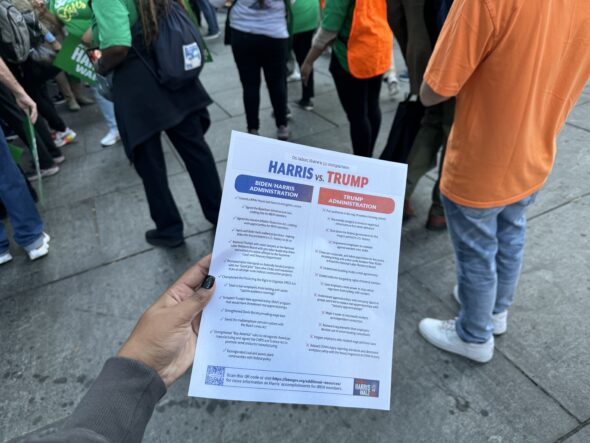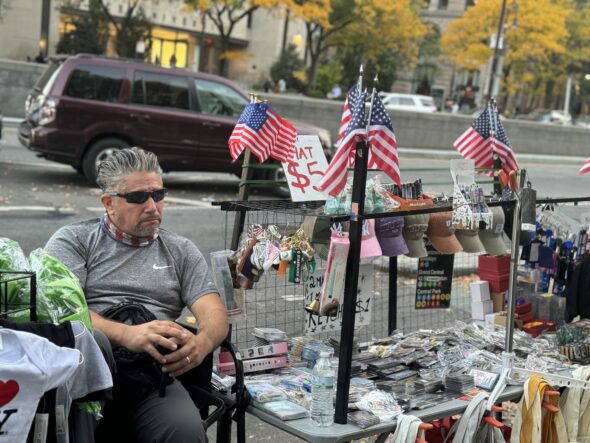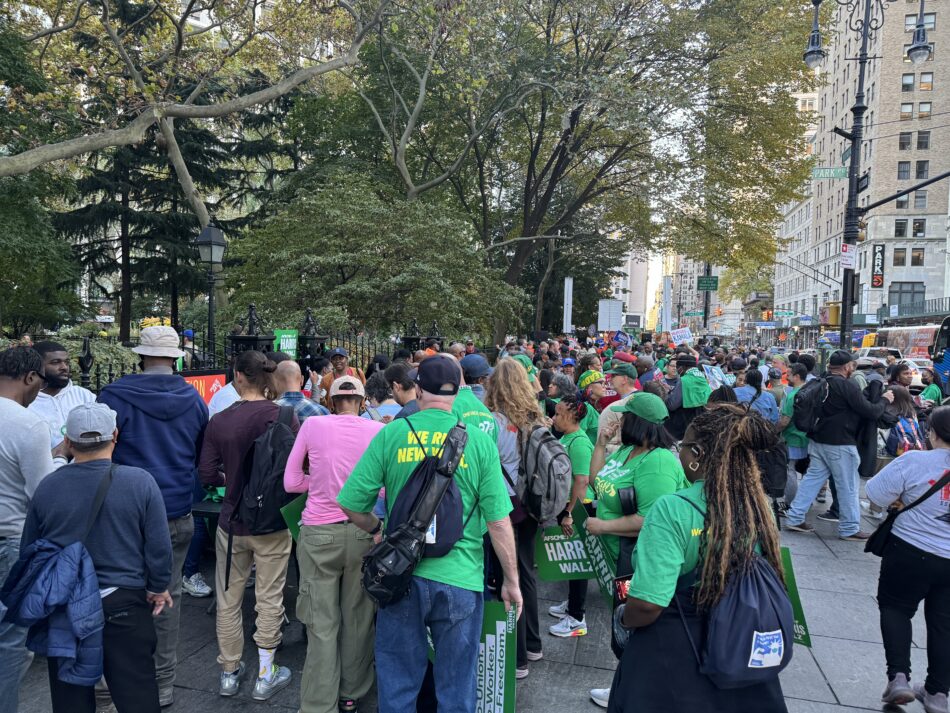At City Hall Park, members across multiple New York City unions came together to attend a ‘Unions for Kamala Harris’ rally on Wednesday hosted by District Council 37— New York City’s Largest Public employee union.
Attendees held up posters reading, “Pro Unions, Pro Workers, Pro Freedom,” and “New York for Harris Walz.” They also chanted triumphant songs like Public Enemy’s “Fight the Power.” The sea of people were there to show their support for Harris while displaying the strength of unions.
On the other side of the park, near the Brooklyn Bridge-City Hall train station, sat Juan Faubla, a licensed street vendor selling New York-themed memorabilia and gifts. His station is filled with trinkets like Statue of Liberty headbands, magnets and T-shirts.
Faubla is a 56-year-old Ecuadorian American veteran from Brooklyn, New York. He said he isn’t a part of a labor union, but thinks they are a great idea.

Juan Faubla, a retired Navy Veteran selling his New York themed Trinkets near the Brooklyn Bride-City Hall train station. (Photo by India Rice.)
“I’m saying it would be nice if I form a veteran union. Like, if you were a veteran, you come and you approach me and you say, look, it’d be nice if we come together because I agree that there is strength in numbers,” said Faubla.
He started vending five years ago after retiring from the Navy where he served 25 years. He said vending was an opportunity to support himself after leaving the service.
“I couldn’t just get another job because of health reasons and mental issues. It’s very difficult to work for people, so I decided to work for myself,” said Faubla. “When I came out of the military, I needed to do something, because you just can’t retire out of the military and do nothing.”
According to the Pew Research Center, only one in four U.S. veterans can find jobs after retiring. For Faubla, vending helped alleviate that need.
“Even though I have a pension to live on, which is also different than a lot of other street vendors, they don’t have that to fall back on, I still needed to do something to stay engaged in society,” said Faubla.
Although he is not actively involved in a union, he feels that his relationship with other vendors and veterans is like one.
“So, in a sense, we’re a union. We just don’t have, dues that we pay, said Faubla. However, he does say that he pays dues by helping citizens out, picking up trash and painting nearby fences.
“Because when you see something wrong, you do something about it, and that’s the fee,” said Faubla. “There’s strength in my case, I’m part of a veteran brotherhood more than an association, more than a formal entity.”
He thinks a union would help alleviate issues like police harassment and sudden location changes. In January, Mayor Eric Adams ordered vendors off the Brooklyn Bridge, stating that their presence was a public safety issue. Faubla was one of those vendors.
“We used to sell on the bridge, right? This same table was on the bridge, but the mayor decided that we shouldn’t be on the bridge, and he used his police officers to take us out of the bridge,” said Faubla.
When it comes to the mayoral race, Faubla is hoping for a candidate who supports vendors and will not enforce legislation like Proposition Two. The proposition on the November ballot would give the Department of Sanitation— in addition to NYPD and Parks Police— the powers to remove street vendors, fine them and detain their equipment.
“The mayor is the leader of the city, but when we take ownership of the bridge, he takes ownership of the city, and his rules, his decisions, affect us in a big way, and it’s frustrating,” said Faubla. “If the police officers want me to move out of here without any reason as to why to move, I’ll have to obey the law, because that is what the police officers represent.”
Faubla also spoke about Vice President Harris and former President Donald Trump’s stances on unions.
“They could do so much. It’s incredible the amount of power that they have that they don’t utilize to help vendors,” said Faubla. “I understand and I observe, Democrats have been better to serve unions, even though there’s the other perception that Republicans are better for Unions.”

Flyers detailing Harris vs Trump policies on union organizing. (Photo by India Rice.)
Under the Biden-Harris administration, unions saw many wins. The administration appointed pro-union members to the National Labor Relations Board NLRB— responsible for protecting worker’s right to organize— and created the White House Task Force for Worker Organizing and Empowerment that aimed to make joining labor unions easier for workers.
Under the Trump administration, labor unions encountered several hurdles. He appointed many pro-management members to the NLRB and issued executive orders that restricted worker freedoms. For example, he signed “Schedule F,” an executive order that reclassified thousands of civil service jobs making civil service workers vulnerable to being fired and replaced with political appointees— the bill was rescinded by Biden in 2021.
The Trump administration also made it easier for employers to force employees into arbitration. In 2018, the Supreme Court set the precedent that workers must file complaints individually and not collectively against their employers in the Murphy Oil vs NLRB and Epic Systems vs Lewis cases.
Now, Harris promises to sign the Protecting the Right to Organize (PRO) Act into law— a bill that would give workers power to organize— if Congress Passes it. Trump has continued to take the stance of union busters. If re-elected, he could follow the lead of Project 2025 policies— a conservative mandate of leadership created by the Heritage Foundation that aims to reshape the federal government if Trump were to be re-elected. The Mandate perpetuates policies that would do things like eliminate overtime pay and the Labor Women’s Bureau.
At the rally, Faubla said he will be voting for Harris in November although he’s not sure about her politics and he sells Trump memorabilia.
“I’m advocating for Kamala Harris, even though I sell her shirts and I sell some stuff [from] Trump. That’s commerce, I have to, I have to provide what brings me an income,” said Faubla. “Even though I haven’t really seen anything that she stands for.”
Faubla also said he has some fears about Trump becoming president again because “he believes that he is above the law.”
“There is a lot of [nervousness] when Trump was president, there was a lot of racial tension, and I am eerie about that again.”
Although he’s concerned about the upcoming election, he believes that his life will not change either way. Faubla is going to continue selling his goods and providing for his family.

Juan Faubla, a retired Navy Veteran selling his New York themed Trinkets near the Brooklyn Bride-City Hall train station. (Photo by India Rice.)
“I consider myself strong because I work every day, and I provide for myself and my family all my life, and I never look for anything [from] anybody else. But I think my life would have been a lot better if I was part of a union,” said Faubla.
“It’s just the right thing to do. It shouldn’t be just the survival of the fittest.”



